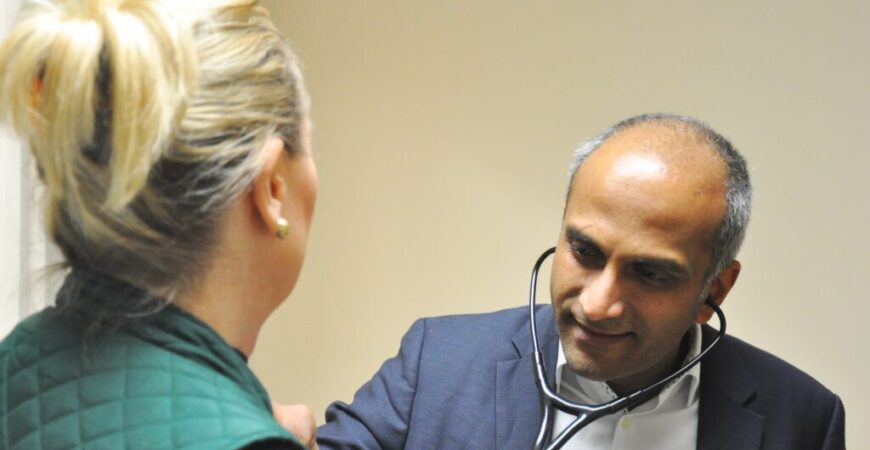It’s likely no surprise that the leading cause of death in Duplin County is heart disease, according to the 2021-22 Community Health Needs Assessment. What might be more surprising is that Duplin has all the tools and resources necessary to help detect, treat and prevent a variety of heart ailments.
ECU Health Heart & Vascular Care’s Dr. Anil George and Nurse Practitioner Jennifer N. Murphy work out of Kenansville, and see as many as 150 patients per week.
“I think we have everything and more that we need to start looking at the heart,” Dr. George told the Duplin Journal. “Should there be any sort of problem with any part of the heart, we have a good start at any one of our clinics.”
Most of the heart issues Dr. George and Murphy see fall into one of two areas — they’re either due to the fact that the heart is a pumping organ or that it’s an electrical organ. That translates to rhythm problems or valve problems, all of which can be detected and treated right here in Duplin County.
“The only thing that Greenville or Wilmington is going to have that we don’t have are processes that are intrinsic to the hospital,” Dr. George said, such as cardiac catheterizations, or stent placement.
Before heart problems develop, however, people have many options for prevention.
“A lot of it is talking to patients about diet and lifestyle, you know, not smoking, getting up and moving, things of that nature,” Dr. George said.
Smoking is a big issue in Duplin County, he explained. “We tell people not to smoke, we try to confirm they know that it causes cancer, it causes strokes, it causes emphysema, it causes loss of life, but they’re like, ‘yeah, but it’s hard to quit so I’m not going to stop,’” Dr. George stated. “That is an answer that’s very hard to swallow, but we have to sometimes.”
Diet is another big factor within the community. “Obviously [with some patients, we] find several areas where things can be improved,” Dr. George explained. “Like, what is your breakfast? What is your lunch? ‘Oh, it’s drive-thru. I just get a sandwich and a beverage from the vending machine and a Snickers bar.’ So then I’m like, what do you do in the evening, when you get home from work? Do you have 10 minutes to walk or 20 minutes to run? ‘Well, when I get home, I’m just so tired. I work until 5 and go back to work at 8 in the morning.’”
These are areas where individuals can work to improve their diet and get more exercise, Dr. George said. “When you go to the grocery store, you have to make choices. You really are what you consume.”
Dr. George and Murphy also emphasize the importance of being aware of symptoms. “Unfortunately,” Dr. George said, “we have a lot of people who are either very busy or stoic or just don’t care, and push through life. I have people who are like, ‘well, this was hurting for about eight months, but I just took a couple of Motrin and went to work.’”
It’s especially important for women to be aware of their symptoms, he added, because their symptoms aren’t the typical sudden grabbing of the chest as depicted on TV shows and movies. “A lot of women come in and all they’re having is gas pain, acid reflux, and you do an EKG and they’re having a heart attack right in front of you,” Dr. George stated. “If anything doesn’t feel right, just get an EKG. It only takes 10 minutes to do an EKG. If it hurts every time you go up the steps … that is your heart trying to get more oxygen and there’s a blockage. Some people are very insistent, it’s not pain, it’s like a tightness in my chest. I think taking symptoms seriously would be another key aspect.”
Murphy pointed out that individuals should also be aware of their blood pressure before they develop hypertension. “They call it the silent killer,” she said. “You may not even have symptoms.”
Dr. George compared staying heart healthy to taking care of your vehicle. “I mean, you would take your car to the mechanic to keep it from breaking down,” he said. “‘Oh shoot, I didn’t see that the air pressure was low.’ I went to the mechanic last week, and they said my battery was so corroded they couldn’t get a read on it. So I was like, ‘OK, take care of it.’ That’s like medical care. Preventing something before it starts.”
 Twitter
Twitter Facebook
Facebook Instagram
Instagram





